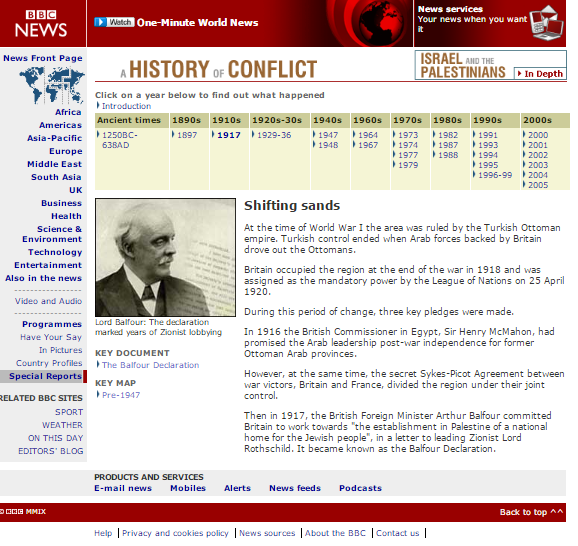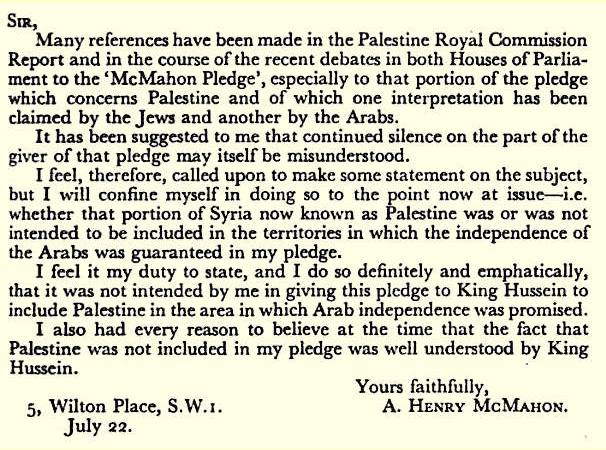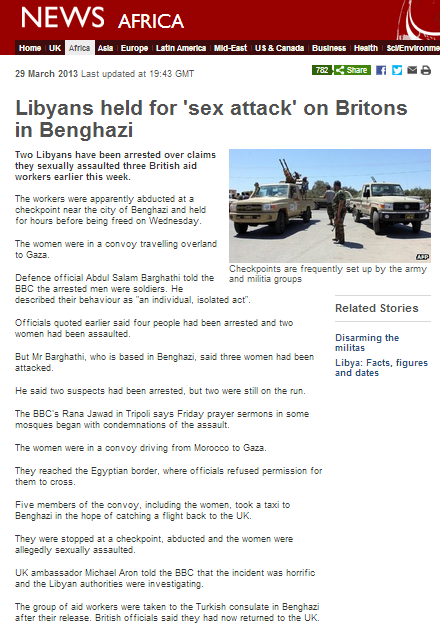h/t SF
In our recent review of BBC portrayal of the Balfour Declaration we noted that one of the backgrounders available online states that:
“During this period of change, three key pledges were made.
In 1916 the British Commissioner in Egypt, Sir Henry McMahon, had promised the Arab leadership post-war independence for former Ottoman Arab provinces.
However, at the same time, the secret Sykes-Picot Agreement between war victors, Britain and France, divided the region under their joint control.
Then in 1917, the British Foreign Minister Arthur Balfour committed Britain to work towards “the establishment in Palestine of a national home for the Jewish people”, in a letter to leading Zionist Lord Rothschild. It became known as the Balfour Declaration.”
Similarly partial portrayals of the Hussein-McMahon correspondence are found in additional material produced by the BBC – for example in an article from May 2016 by Jim Muir on the topic of the Sykes-Picot agreement and in an article by Kevin Connolly from July 2015. In May 2015 listeners to BBC World Service radio were told by historian-cum-political activist Avi Shlaim that:
“…Britain’s behavior during the First World War is a prime example of pure opportunism because in the course of fighting the First World War, Britain was desperate to gain allies and it made three major promises that were contradictory and couldn’t be reconciled and this should have been clear during the war. The first promise was to Hussein the Sharif of Mecca – to support an independent Arab kingdom under his rule in return for mounting an Arab revolt against the Ottoman Turks. The second promise […] is the Sykes-Picot Agreement of 1916. This was a secret agreement between Britain and France to carve up the Middle East between themselves at the expense of the Arabs. And the third and most famous promise was the Balfour Declaration of 1917 in which Britain undertook to support the establishment of a national home for the Jewish people in Palestine. So Palestine was the twice-promised land – first it was promised to Hussein the Sharif of Mecca and then it was promised to the Zionists.” [emphasis added]
In an ‘educational’ feature about the First World War produced in September 2014 and presented by BBC News diplomatic correspondent Bridget Kendall, BBC audiences are told (in section 5) that “British diplomats made a series of seemingly contradictory promises to potential allies” before being presented with portrayals of the Hussein-McMahon correspondence, the Sykes-Picot agreement and the Balfour Declaration.

As has been previously noted here on several occasions, Sir Henry McMahon himself pointed out in a letter to the Times in 1937 that the claim according to which “Palestine was the twice-promised land” is incorrect.

That point had earlier been clarified in the British government’s White Paper of 1922.
“With reference to the Constitution which it is now intended to establish in Palestine, the draft of which has already been published, it is desirable to make certain points clear. In the first place, it is not the case, as has been represented by the Arab Delegation, that during the war His Majesty’s Government gave an undertaking that an independent national government should be at once established in Palestine. This representation mainly rests upon a letter dated the 24th October, 1915, from Sir Henry McMahon, then His Majesty’s High Commissioner in Egypt, to the Sharif of Mecca, now King Hussein of the Kingdom of the Hejaz. That letter is quoted as conveying the promise to the Sherif of Mecca to recognise and support the independence of the Arabs within the territories proposed by him. But this promise was given subject to a reservation made in the same letter, which excluded from its scope, among other territories, the portions of Syria lying to the west of the District of Damascus. This reservation has always been regarded by His Majesty’s Government as covering the vilayet of Beirut and the independent Sanjak of Jerusalem. The whole of Palestine west of the Jordan was thus excluded from Sir Henry McMahon’s pledge.” [emphasis added]
One must therefore ask why the BBC – committed as it is to accurate and impartial journalism – continues to enable promotion of the politically motivated myth of ‘contradictory promises’ relating to the area later assigned to the Mandate for Palestine.




